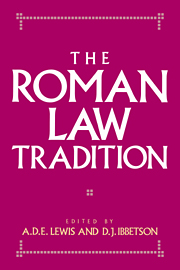Book contents
- Frontmatter
- Contents
- List of contributors
- Foreword: Peter Stein, Regius Professor of Civil Law in the University of Cambridge, 1968–1993
- List of abbreviations
- 1 The Roman law tradition
- 2 Labeo and the fraudulent slave
- 3 Doing and causing to be done
- 4 The danger of definition: contrectatio and appropriation
- 5 Going to the fair – Jacques de Révigny on possession
- 6 Bembo giureconsulto?
- 7 Gentilis and the interpretatio duplex
- 8 Ius gentium in the practice of the Court of Admiralty around 1600
- 9 Stair's title ‘Of Liberty and Servitude’
- 10 The actio communi dividundo in Roman and Scots law
- 11 Sale and transfer of title in Roman and Scots law
- 12 ‘What Marcellus says is against you’: Roman law and Common law
- 13 Audi et alteram partem: a limit to judicial activity
- Index of sources
- Index of names and subjects
12 - ‘What Marcellus says is against you’: Roman law and Common law
Published online by Cambridge University Press: 08 October 2009
- Frontmatter
- Contents
- List of contributors
- Foreword: Peter Stein, Regius Professor of Civil Law in the University of Cambridge, 1968–1993
- List of abbreviations
- 1 The Roman law tradition
- 2 Labeo and the fraudulent slave
- 3 Doing and causing to be done
- 4 The danger of definition: contrectatio and appropriation
- 5 Going to the fair – Jacques de Révigny on possession
- 6 Bembo giureconsulto?
- 7 Gentilis and the interpretatio duplex
- 8 Ius gentium in the practice of the Court of Admiralty around 1600
- 9 Stair's title ‘Of Liberty and Servitude’
- 10 The actio communi dividundo in Roman and Scots law
- 11 Sale and transfer of title in Roman and Scots law
- 12 ‘What Marcellus says is against you’: Roman law and Common law
- 13 Audi et alteram partem: a limit to judicial activity
- Index of sources
- Index of names and subjects
Summary
Introduction
The influence of Roman law upon the law in England, whether directly or through the medium of Canon law, has been the subject of much recent attention. Helmholz has shown in a series of studies how the ecclesiastical jurisdictions, often applying Roman notions, anticipated and supported a number of legal developments in the Common law, for example in the fields of guardianship and defamation. Seipp has demonstrated that Common law courts occasionally admitted Civil lawyers to plead – in one 1428 case one Andrew Huls ‘argued much in Latin’ – or consulted Civil lawyers outside the court in cases involving marriages and wills.
The early brush with Roman legal ideas in the Latin treatises of Glanvill and Bracton are thus shown not to have been the isolated events they were once considered to be. An awareness of Roman solutions – though one might also say a wariness of Roman solutions – is to be found throughout the history of the Common law down to modern times.
These influences upon the substantive solutions advanced in the Common law courts continued into the seventeenth and eighteenth centuries. In his famous and influential judgment Coggs v. Bernard Chief Justice Holt enumerated a list of contracts utilising Roman categories. In the later eighteenth century a number of leading English judges, amongst them Lord Mansfield and Mr Justice Wilmot, displayed and made use of Roman texts and arguments. Such occasional forays into the Roman world continued into the nineteenth century.
- Type
- Chapter
- Information
- The Roman Law Tradition , pp. 199 - 208Publisher: Cambridge University PressPrint publication year: 1994
- 1
- Cited by



